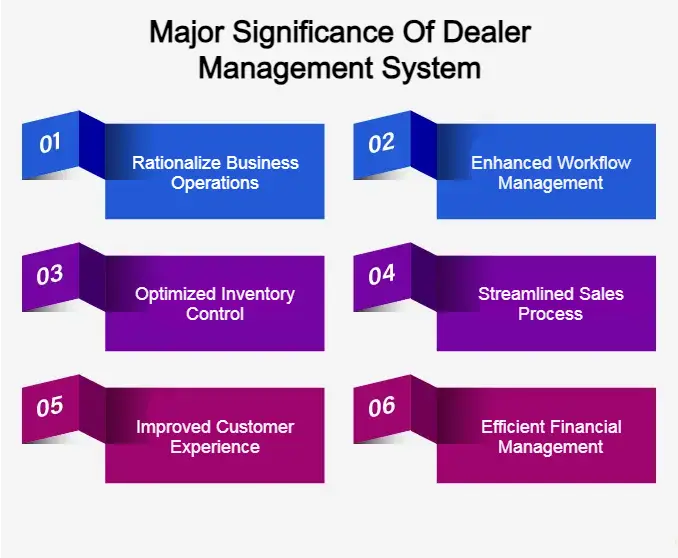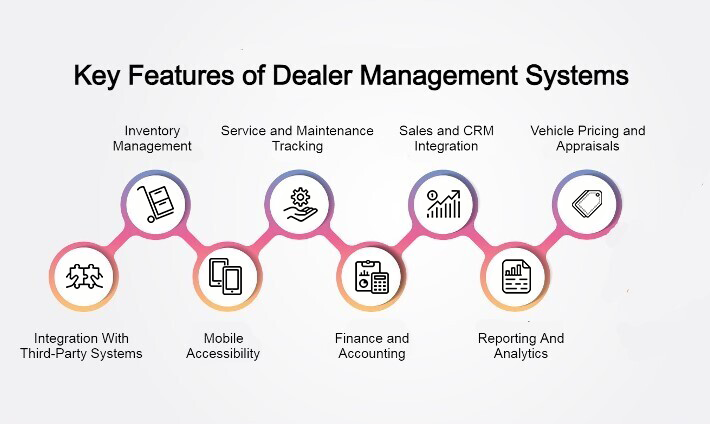A dealer management system (DMS) is software that helps dealers manage dealerships, streamline financial aspects, and improve production efficiency across the organization. In fact, it is one of the sought-after software in the manufacturing and non-manufacturing industries. The major role of the dealer management system is to streamline day-to-day operational challenges, including financial management, sales management, marketing management, production management, etc.
As the market is super evolving with tech breakthroughs, organizations are capable enough to handle complex issues with data-driven insights, detect anomalies before massive destruction, predict productions and supplies, and much more. However, the upsurge of software involvement incredibly turns humanistic tasks into automation with super efficiency.
Similarly, DMS unifies all major departments into one centralized solution where every function is associated with collective organizational objectives. The major function of the dealer management system is to manage deals, clients, inventories, sales, and reporting & analysis. In this article, you will explore the significance of dealer management and the must-have features that make your DMS market compatible.
However, the demand for Dealer Management Systems (DMS) in the automotive industry has been steadily increasing over the years. DMS software plays a crucial role in managing various aspects of automotive dealership operations, including inventory management, sales tracking, customer relationship management (CRM), accounting, and service scheduling.
Infact, the worldwide market for Automotive Dealer Management Systems reached a value of USD 3000.0 million in 2021 and is projected to grow at a compound annual growth rate (CAGR) of 10.63% over the forecast period. The estimated expansion is anticipated to propel the market to a value of USD 5500.0 million by the year 2027.
Major Significance Of Dealer Management System
Investing in a dealer management system can be crucial to simplifying your business operation. Industries like automotive, textile, real estate agents, and other dealership-oriented businesses can implement DMS to achieve better results and lucrative earnings.
Getting your dealer management system development done by professional tech experts can give you multiple benefits, such as:

Rationalize Business Operations
A good dealer management system must be able to synchronize multiple departments to boost effective communication and collaboration. However, the aim of unifying multiple business operations is to track and monitor day-to-day tasks without any discrepancies. The more everyone collaborates on one platform, the more they feel connected and can make informed decisions.
Enhanced Workflow Management
One of the primary benefits of a Dealer Management System is its ability to streamline workflow management. Moreover, DMS enables seamless coordination across departments by integrating various aspects of dealership operations into a centralized platform. From sales and inventory management to finance and customer relations, every facet of the business is efficiently synchronized, reducing redundancies and minimizing errors.
Optimized Inventory Control
Inventory management software lies at the core of dealership operations, and a robust DMS empowers dealers to take full control. With real-time tracking capabilities, dealers can effortlessly monitor inventory levels, identify fast-moving products, and make data-driven decisions to optimize stock levels. Inventory controlling not only prevents overstocking or understocking but also ensures that the right vehicles are available to meet customer demands promptly.
Streamlined Sales Process
In the competitive landscape of automotive retail, speed and efficiency are paramount. A DMS streamlines the sales process from start to finish, simplifying tasks such as lead management, vehicle pricing, and contract processing. By automating mundane tasks and providing sales teams access to comprehensive customer data, DMS enables them to focus on what truly matters – building relationships and closing deals.
Improved Customer Experience
In today’s digital age, customers expect nothing less than exceptional service. A DMS is pivotal in enhancing the overall customer experience by providing a seamless journey from browsing to purchase. With integrated CRM functionality, dealerships can track customer interactions, personalize communications, and anticipate their needs effectively. However, this personalized approach fosters loyalty and encourages repeat business, driving long-term profitability.
Efficient Financial Management
Managing finances with finance software is a critical aspect of dealership operations, and a DMS simplifies this complex process to make finance management a core functionality. DMS provides comprehensive tools to ensure financial health, from tracking expenses and processing payments to generating financial reports. By automating tasks and providing real-time insights into cash flow, dealers can make informed decisions to maximize profitability and mitigate risks effectively.
Key Features of Dealer Management Systems

Inventory Management
The feature of inventory management helps track and manage inventory levels efficiently, including new and used vehicles, parts, and accessories. Moreover, the real-time updates ensure accurate stock information and minimize overstocking or understocking issues that ultimately reduce cost.
Sales and CRM Integration
Integrate customer relationship management (CRM) functionalities with sales processes to streamline lead management, customer interactions, and sales tracking. CRM integration enables a track record of sales and personalized communications as well as enhances customer satisfaction.
Finance and Accounting
Comprehensive financial management tools facilitate tasks such as invoicing, payment processing, and financial reporting. They also automate accounting processes to ensure accuracy as well as compliance while optimizing cash flow.
Vehicle Pricing and Appraisals
Utilize pricing features to set competitive prices for vehicles and accessories. Additionally, incorporate appraisal features to assess trade-in values accurately, empowering sales teams to negotiate effectively.
Service and Maintenance Tracking
A futuristic dealer management system must track service appointments, maintenance schedules, and repair orders efficiently. By adding these features, you can streamline service operations, allocate resources effectively, and enhance customer satisfaction with timely service reminders.
Reporting And Analytics
With reporting and analytics features in DMS, you can access detailed reports and analytics to gain insights into dealership performance, sales trends, and customer behavior. Make data-driven decisions to optimize operations, identify opportunities for growth, and mitigate risks.
Integration With Third-Party Systems
To make your DMS scalable and adaptive, allow third party systems to integrate easily with no time. Seamlessly integrating with third-party systems such as manufacturer databases, finance providers, and marketing platforms can make your DMS more powerful. Moreover, this interoperability ensures a unified ecosystem and enhances overall efficiency.
Mobile Accessibility
Offering mobile accessibility for sales representatives and service technicians, allowing them to access critical information and perform tasks on the go. Additionally, it can enhance productivity and responsiveness with anytime, anywhere access.
Ready To Implement DMS In Your Business?
Choosing the right dealer management software development company will help you revolutionize your workflow efficiency. At MMC Global, we provide end-to-end software development services to all sizes of companies, including small-to-medium and enterprise-grade businesses. Moreover, our qualified software developers build feature rich software solutions with complex infrastructure and advanced technologies, including AI, ML, cloud computing, blockchain, etc.
If you want to build DMS or any other software to streamline your business operations, we are here to assist you in every step of the whole software development lifecycle. Let’s fasten your operation, reduce costs, and deliver best!
